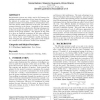Free Online Productivity Tools
i2Speak
i2Symbol
i2OCR
iTex2Img
iWeb2Print
iWeb2Shot
i2Type
iPdf2Split
iPdf2Merge
i2Bopomofo
i2Arabic
i2Style
i2Image
i2PDF
iLatex2Rtf
Sci2ools
IIR
2010
2010
An Empirical Comparison of Collaborative Filtering Approaches on Netflix Data
Recommender systems are widely used in E-Commerce for making automatic suggestions of new items that could meet the interest of a given user. Collaborative Filtering approaches compute recommendations by assuming that users, who have shown similar behavior in the past, will share a common behavior in the future. According to this assumption, the most effective collaborative filtering techniques try to discover groups of similar users in order to infer the preferences of the group members. The purpose of this work is to show an empirical comparison of the main collaborative filtering approaches, namely Baseline, Nearest Neighbors, Latent Factor and Probabilistic models, focusing on their strengths and weaknesses. Data used for the analysis are a sample of the well-known Netflix Prize database. Categories and Subject Descriptors H.2.8 [Database Application]: Data Mining Keywords Recommender Systems, Collaborative Filtering, Netflix
Collaborative Filtering | Collaborative Filtering Approaches | IIR 2010 | Information Technology | Recommender Systems |
Related Content
| Added | 29 Oct 2010 |
| Updated | 29 Oct 2010 |
| Type | Conference |
| Year | 2010 |
| Where | IIR |
| Authors | Nicola Barbieri, Massimo Guarascio, Ettore Ritacco |
Comments (0)

